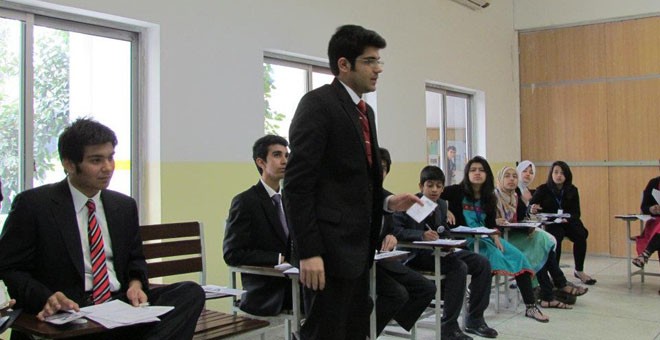

"Debating has been a very integral part of my life because it has made me more confident, and taught me to always strive for excellence and to never give up," says Alhan Fakhr, the former President of the Aitchison College Debating Society.
Debates, both parliamentary style and declamations, have become an intrinsic part of the school culture in Lahore and other major cities across Pakistan over the past couple of decades. The Raziuddin Sheikh U-19 Parliamentary Debating Competition and the Sonu Rehman U-17 Parliamentary Debating Competition are two of the country’s most anticipated school-level events. Other debating competitions witness similar fervour from both the youth and the veterans.
Debaters, past and present, enjoy a strong bond between themselves, making this community even more special.
However, the general perception across non-debaters is that people use this ‘activity’ as a means to an end including, but not limited to, a strong resume for university admission, superior status among peers and a sense of entitlement.
"I think people do it more as a means to impress their school administrations. But due to the level of commitment and the time it takes, only someone who is truly passionate about it sticks to it till the end," adds Alhan.
Parliamentary debates, in particular, require a lot of time and commitment. According to Hamza Ghaznvi, formerly a multiple awarding winning debater at SISCAS and President of the debating and MUN society, "Parliamentary debating does not only polish your speaking skills but also make you more confident, open-minded and informed.
"MUN-ning, on the other hand, teaches you the art of diplomacy," he adds. "You impersonate the world’s leaders and represent a country’s ideology."
Parliamentary debates, as per Alhan, "test one’s endurance. Not everyone gets rewarded in debates; only the good ones do."
Supporters of debates often cite the time spent researching and preparing cases as critical for their intellectual development. Saif Maqbool, the current 3rd best speaker in Pakistan (U-19) and a shortlisted candidate for the Pakistan National Team, believes that "debates are beneficial because they teach you how to think."
"Debating in school has taught me how to organise my thoughts. By debating I have greatly increased my general knowledge," says Alhan when prompted about his ‘passion’.
Debaters also draw comparisons between debates and dramatics, often linking the two and claiming that these are more similar than what appears to the eye. Often the best and the most memorable speeches make use of drama, such as Martin Luther King Jr.’s "I have a dream" speech.
"Debates are a lot about theatrics," explains Alhan. "It’s not as much about what you say as it is about how you say it."
However, over the past decade, other activities such as the Model United Nations (MUNs) and the Youth Leadership Conference have been receiving greater attention than parliamentary debates and declamations. This can be attributed to the difficult, time-consuming nature of debates. I personally stopped debating last year because I noticed a dip in my academic performance and I hardly ever got the time to pursue any other activity. Preparation camps, not to mention the numerous competitions once the debating season iss in full swing, keep one occupied till as late as midnight on more than four days a week.
Model United Nations Conferences have increasingly become popular among Pakistan’s youth, reflected by the successes of institutions such as LUMS, The Lyceum School in Karachi and Aitchison College, Lahore in international Model UN conferences. Reflecting on his experiences in both MUNs and Parliamentary style debates, Alhan says, "In a MUN, one has to work less as compared to regular debates. This is what makes them easier, and in turn, more winnable."
Some debaters have also questioned the management of the DSP (Debating Society of Pakistan). "The same people that coach the schools also run the whole system," says Saif who is freshly coming from a Pakistan National Team selection camp.
"There needs to be systematic reforms. To start with, there should be no more school coaches on the Pakistan National Team selection panel. That is the only way to ensure that there is an unbiased Pakistan team."
However, the DSP should be credited for organising a multitude of debating competitions throughout the season. Due to this, intense rivalries exist in debates, which have prevented the activity from losing its spirit. A recent example is the final of the Raziuddin Sheikh U-19 Parliamentary Debating Competition 2013, which saw Karachi Grammar School go neck-to-neck with Aitchison College, renewing an age-old rivalry. The debate was toughly contested, leaving the judging panel to scratch their heads. The result was a split decision in favour of Karachi Grammar School, and the jubilation displayed by the Karachiites at the announcement was a sight to behold.
While debates may have lost some excellent orators and thinkers to other activities, they still hold an extremely important and unique position among the youth of Lahore and other cities across Pakistan. It is certainly up to the debaters of today to promote the activity as much as they can for the next generation to continue to believe in its usefulness.